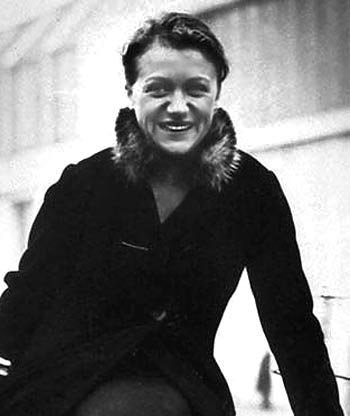
You might already know who she is. You might not. Don't worry. That's why you're here.
The Little Girl Who Wanted to Fly
The longing grew in me, grew with every bird I saw go flying across the azure summer sky, with every cloud that sailed past me on the wind, till it turned to a deep, insistent homesickness, a yearning that went with me everywhere and could never be stilled.
Once upon a time, there was a little girl who wanted very much to fly. To her, the ground was just a staging area, her true home nought other than the sky. Alas, the ground and all its limits could not be ignored.
Therefore the little girl didn't ignore them, she solved them. While still small, she jumped off a rooftop in a bid to fly. Since four-year-olds in 1916 didn't have wings, that attempt failed. The little girl was forced to revise her plans. Then she heard of planes.
With that, the little girl's dream started to take more concrete form. In order to touch the sky, she needed to be on a plane. In order to fly a plane, she needed to become a pilot.
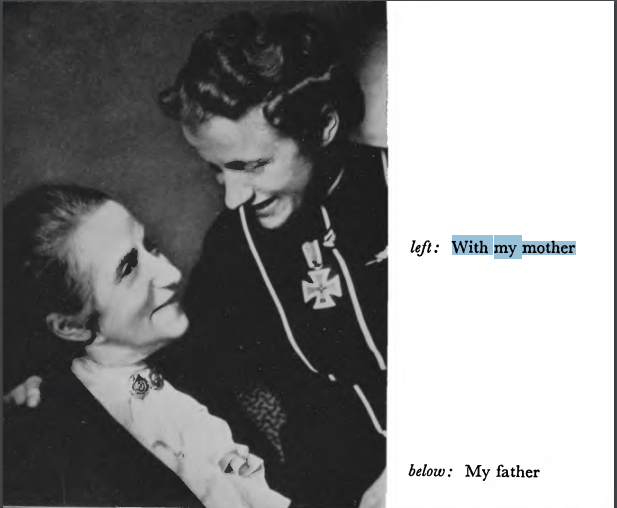
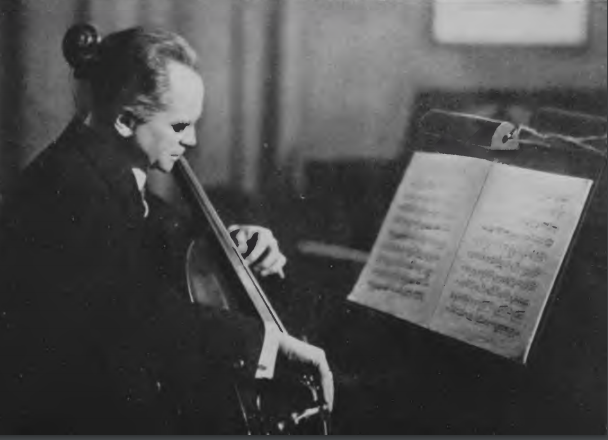
The little girl's parents, she knew, were going to be an obstacle. Her father, the eye doctor and her mother, the devout Christian would surely object to their daughter running off to risk her life in these new-fangled flying whatsits. She had to find a solution that would keep them happy. With that in mind, she told them she was going to be a doctor (like dad) -- in fact, a missionary doctor (which would please mom.) Conveniently this meant she would have to learn to fly planes in order to perform this noble calling in the faraway lands of Africa and/or the Middle East. What a coincidence.
This kind of solution would become a pattern as the little girl became a bold woman.
Faced with the next challenge of her parents refusal, the girl borrowed lessons of focus and character from the writings of Ignatius of Loyola and added them to her own determination and ingenuity. She made a deal with her father that the words "flight school" would not pass her lips until she finished secondary school and that, if she did this, he would then permit her to go to flight school. He agreed but with an added condition that she must study domestic science (which I have to assume is exactly what it sounds like)
Obviously she succeeded or you wouldn't be reading this.
The Engines and The Sky
I soon realized that it meant little to be able to fly a powered plane, that was quickly learned. But if a pilot knew nothing about the engine, he was ignorant of the very heart of his machine; I made up my mind, therefore, that I would learn everything there was to know about it.
By 1930, being who she was, the girl followed through on the deal with dear old dad. She studied domestic science, started studying medicine and gained access to flying school at the Grunau School of Gliding. Gliders were unpowered aircraft that relied on the pilots skill and ability to use the wind to their advantage to stay in the sky. She soon distinguished herself by setting a glider flight time record of five hours. Her autobiography The Sky My Kingdom shows her following birds through the sky to find the best updrafts of wind.
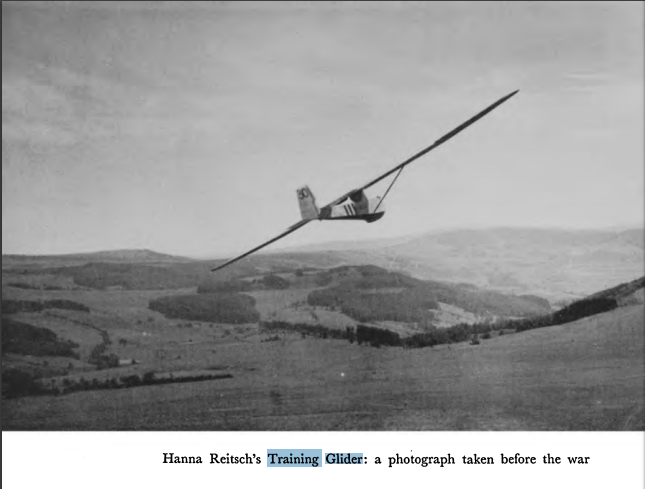
In fact she did so well that the powers-that-be thought she was either cheating or being cheated for so they retested her and she passed with flying colours again.
Eventually, she transitioned from glider school to The German Air Mail flying school in Staaken. Another deal with her parents made this possible; in exchange for being permitted to learn to fly engined craft, she would have to pay for the lessons out of her medical school fees! And so she did. Every morning, the girl would bicycle to Staaken at 5AM every day, the only woman among a large group of men training to fly. But she did not stop with flying; she pestered the mechanics until they started teaching her about engines too. Soon she got to the point where the head mechanic made her strip down and rebuild an engine to prove herself.
She did, of course. With bleeding hands and no sleep and two days of effort and meticulous drawings of every machine part, she did.
After that rite of passage, the mechanics accepted the young woman as much as the pilots had. Her skills grew, her knowledge grew and she flew and flew and flew. As an useful aside, she decided she needed to know how to drive as well. Lacking more money to pay for driving school and knowing no owner would teach her, she charmed a bunch of tractor drivers into letting her drive their tractor, indeed learning to drive in the process.
Along the way, she also learned lessons as sadly true today as it was in the 1930s: veterans seem to get poorly treated when they come home:
The older ones had been through the First World War, you could tell
it from their faces and their scars. After doing their duty for years in the trenches, they had returned home to be insulted and spat upon and have the shoulder-straps tom by hooligans from their uniforms. It was no wonder that their experiences had made them very embittered.
and that politics can deeply divide even people with so much in common:
But as soon as the men began to talk politics, our good relations threatened to be disturbed. In the whole gang there were hardly two who belonged to the same party and with horror I realised how people who otherwise get on well together can become bitter and fanatical opponents as soon as politics are mentioned. It was all new to me, for though naturally I had been brought up to be a patriot, there had never been any question of political divisions in my home.
However, while these ground-bound concerns were important, her priority remained the sky. Soon she was flying noisy engined planes, a different experience from the wind-borne silent isolation of a glider.
Historical Aside: The reason gliders were so popular in 1930s Germany is because the treaties after World War 1 restricted who, when and how many could fly engined aircraft. Thus flyers got their fix of sky by using gliders with no engines instead. To this day, Germany remains one of the top countries for sport gliding as a result of that legacy.
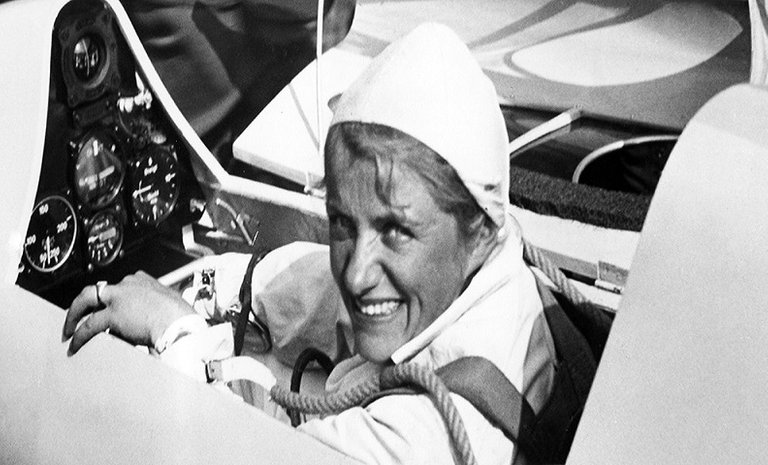
While all this was going on, her parents still insisted that she continue her medical studies, something she had neglected for flying. Due to some funny circumstances with a one-legged glider teacher, she ended up mastering the structure of the knee. When her parents blackmailed her into going to a medical school oral exam, imagine her surprise when the questioner only asked her about exactly that joint.
Of course, as funny as accidentally passing a medical school exam was, she did not truly care about this; the sky was her home.

After this came trial and tribulations and happy experiences. She participated in flying contests, did stunt flying for movies, taught students of her own, broke altitude records (including one by flying into a storm cloud and suffering hundreds of holes in her glider wings by hailstones ), distance records, became the first person to fly a helicopter inside a building and traveled the world, to South America and Lisbon and Casablance. It was a joyful time. She even went to America, a country for which she held great admiration -- even if by the late 1930s, anti-German sentiment was making its presence felt as political, economic and imperial forces in Europe stirred the world toward the inevitable, rumblings of what was to come.
The War
Hitler, I could see, was living in some remote and nebulous world of his own and the appalling implications of this discovery suddenly burst upon me. Forgetting for a moment the respect due to his position, I broke in on his reflections in mid-sentence and objected loudly: "Mein Fiihrer, you are speaking of the grandchild of an embryo!" Hitler looked up with a start and stared at me questioningly
Given the silence and steep diving angles that were possible for gliders, it didn't long for military innovators to see the possibilities for troop insertion. The woman, now a famous and skilled celebrity of the sky, was called in to test these new military gliders. It was not long before she came to the attention of the Nazi High Command including Hitler himself.
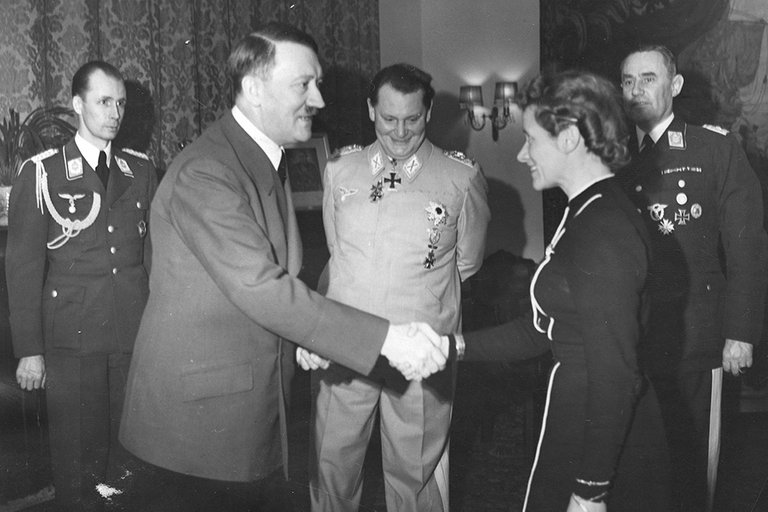
Along the way, she incurred both an Iron Cross and a monster case of scarlet fever. She was injured more than once in the line of duty, testing experimental aircraft and creating counter-measures to the British countermeasures to German gliders and planes.
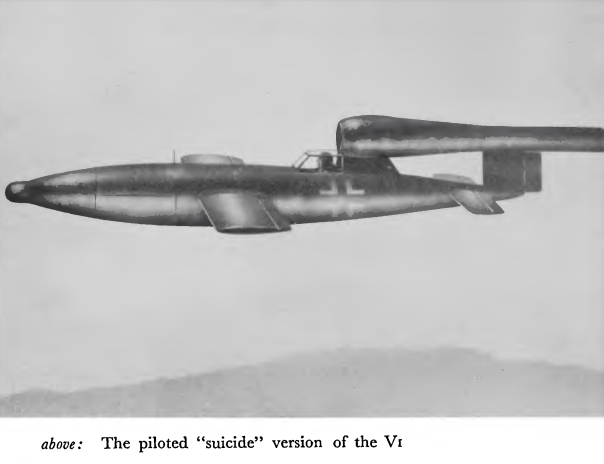
So it went, even as the war began in 1939 and dragged on. By 1943, it was clear that Germany was losing the war. They had been drained to a standstill in Russia and overwhelmed by the entry of America into the war. Desperate solutions began to arise and, completely independent of Japan's own kamikaze units, the woman and her colleagues thought of a suicide corps of pilots who would attack and destroy strategic targets, not to win the war but to weaken the Allies enough that all involved parties would be forced to negotiate peace.
She and her colleagues attempted to persuade the Nazi High Command of the importance of this desperate dangerous strategy but Hitler would not hear of it. As far as he was concerned, such desperation was for losers and Germany could still win. She managed to persuade him to at least let them continue developing the program in case he changed his mind later.

In the end the suicide corps never happened. Her role at the very end of the war is notable because she was one of the very last people to meet Hitler alive. On 25th April 1945, high-ranking Luftwaffe officer von Greim was ordered to fly to Berlin even through the guns of the Russians and Americans to see Hitler in his bunker. There was only one copilot he trusted to get him there. Together they traveled as close to Berlin as they could, hopped on a Fieseler Storch and carried out this incredibly dangerous flight into a city that no other German plane had been able to survive entering due to Russian siege. At first Greim was flying until Russian ack-ack bullets punched through his foot and rendered him unconscious from blood loss. She took over the stick and got them there with multiple bullet holes in the plane and even the fuel tanks.
Once there, Hitler revealed he was appointing von Greim as the Field Marshall of the Luftwaffe, a pointless promotion for a war that was ending in days but Hitler was lost to delusions, of persecution and hope and despair. He even gave them poison to hold on to so they could die with him in the event of defeat. However, by some chance, he was able to order a pilot to come and get both her and Greim out of there and so they escaped.
As they had both thought, it didn't matter. Two days later, Hitler was dead and she was captured by the Americans who thought she might have secretly flown Hitler to safety. While under their capture, she learned that her father had killed their family and himself to avoid what the Russian troops marching into the city would have done to them.
That was how the war ended for the woman.
After
And what have we now in Germany? A country of bankers and car-makers. Even our great army has gone soft. Soldiers wear beards and question orders. I am not ashamed to say I believed in National Socialism. I still wear the Iron Cross with diamonds Hitler gave me. But today in all of Germany you can't find a single person who voted Adolf Hitler into power ... Many Germans feel guilty about the war. But they don't explain the real guilt we share – that we lost.
After the War, after she was released from American custody, the woman returned to Frankfurt. As with after World War 1, Germans were again banned from using powered aircraft for some time. As with after WW1, the woman once again took up her first love, glider aircraft. She did not rest on her laurels either, breaking more records of altitude and endurance.
She went on to travel as far as Ghana to start a flying school there, along the way becoming friends (and possibly more) with Kwame Nkrumah. Ironic for a devout follower of Hitler who was always dismissive at best of Negros in her autobiography.
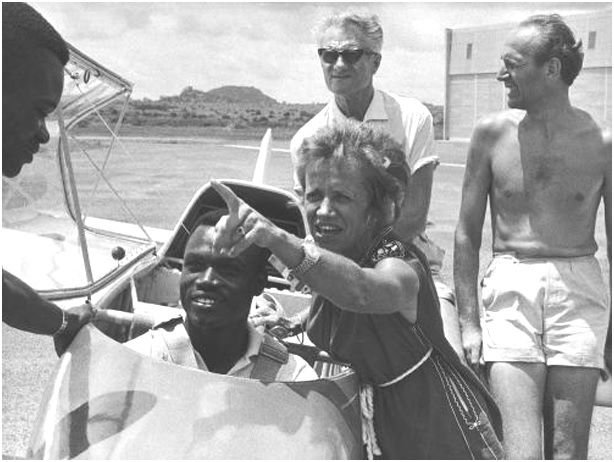
The Aircraft
It is impossible to tell this story without talking about the planes and gliders and helicopters she flew. I am sure she would agree.
Mercedes-Klemm: her first powered-flight aircraft, Otto Thomsen taught her to fly in one of these. It was a low-powered civilian aircraft, one of the few that the Versailles Treaty made after World War 1 permitted. It had dual controls, making it ideal for training because the teacher could fly up with the student and hijack control whenever necessary. It was one of her proudest moments the first time she was allowed to fly one alone.
Focke-Achgelis: she was the first to fly a helicopter indoors. The FA 61 was that helicopter.

Pilotable V-1 Prototype: my research tells me that the V-1 was supposed to be missile like the V-2 that was used to bombard Britain. Mz. Reitsch was part of the group that proposed and tested using it as a flying suicide bomber weapon.
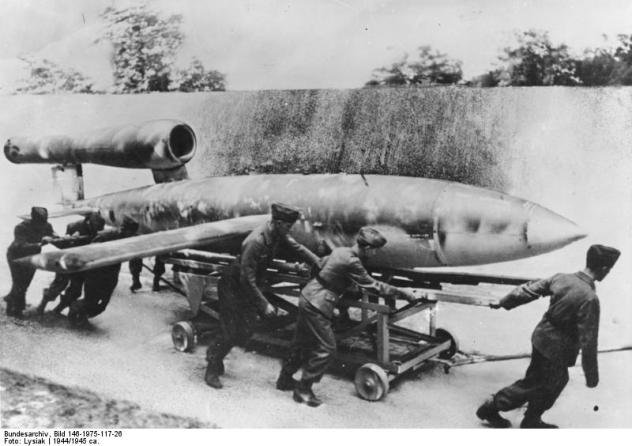

Fieseler Storch: this was the plane she and Greim used to fly to Hitler's bunker under heavy Russian anti-aircraft fire. It was a liaison aircraft with foldable wings for easy storage and short take-off and landing requirements.
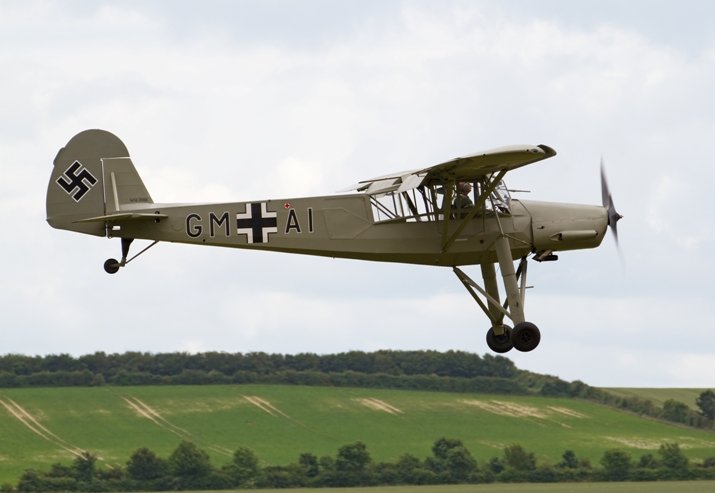%20-%20wikipedia.jpg)
The End
Flying—that is my life. Flight over the earth is its symbol. May flying in future serve only to bring men and peoples closer together.
Well, I guess greatness isn't limited to the good guys. The woman, who by now you know is Hanna Reitsch, died in 1979 of a heart attack at the end of a long life full of successes and achievements in aviation. Despite being a part of the Nazi war machine, she left a legacy beyond the horrors of the ground. She left a legacy of the sky.
Bibliography
https://archive.org/stream/HannaReitschTheSkyMyKingdom/Hanna_Reitsch_The_Sky_my_Kingdom_djvu.txt - Full text of her autobiography. All quotes in her own words are from there.
http://www.history.com/this-day-in-history/test-pilot-reitsch-pitches-suicide-squad-to-hitler - where it turns out the Nazis had kamikazes before the Japanese
http://histclo.com/essay/war/ww2/bio/r/w2b-reitsch.html
http://centennialofwomenpilots.com/hanna-reitsch-germany/
--
For more in this series:
Part One - The Lethal Lyudmila Pavlichenko
Part Two - The Formidable Nancy Wake
For my other series about the lost history of women in (human) computing:
Part One - Lady Ada Lovelace, first lady of computing
Part Two - Hedy Lamarr, the grandmother cool aunt of wifi and bluetooth who also managed to be a superstar actress on the side
Part Three - Henrietta Swan Leavitt, the unsung heroine who heard no songs but read the music of the stars themselves.



Thanks for reading.
Sincerely,
@madmaxfury
Wonderful post, really well researched and cited. What a fascinating woman! Thanks for sharing this :)
Much love - Carl
It is my pleasure
Yeah, this was truly an amazing post. Madmaxfury did an incredible job of research for it, I can see.
If I could vote this article a million times, I would. It's obvious you have done so much research on Hanna Reitsch. I knew who she was from the first picture. Great work, I am so in love with this. @madmaxfury
I long to see that happen in anycase i would keep working round the clock ):-
a great piece indeed
Thanks bro
You let on the fury on this one :)
Good job in this very entertaining and educative read.
@Greenrun,i am pleased
Great post well detailed and researched. Nice work
Thanks for your time
Good work, brother. Are you a historian?
Thanks fam
Waw, a very useful post. This article can also provide a new understanding for those who do not yet know it. Thanks for posting @madmaxfury. Good job
@original works
I summon thee!!!@originalworks,
Good job! Thanks to @edumurphy you have planted 0.49 tree to save Abongphen Highland Forest in Cameroon. Help me to plant 1,000,000 trees and share my Steem Power to the others. Selfvoting is prohibited, but that should be the reason to spread the world to protect our precious environment. Check out profile of our conservation association @kedjom-keku and the founder/coordinator @martin.mikes to get more information about our conservation program. My current SP is 14500.76. Help me to plant more trees with your delegated SP.
Thanks a lot,
www.kedjom-keku.com your @treeplanter
Well,this is actually the first post i've actually taking time to read to the end since i joined steemit....such a great [email protected] of inspiration and educative,now i know hanna reitch and how she was a backbone in the nazist movement...im stunned by her doggedness imaging channelling that much towards a better course other than war..thanks bro for inculcating knowledge..great piece once again